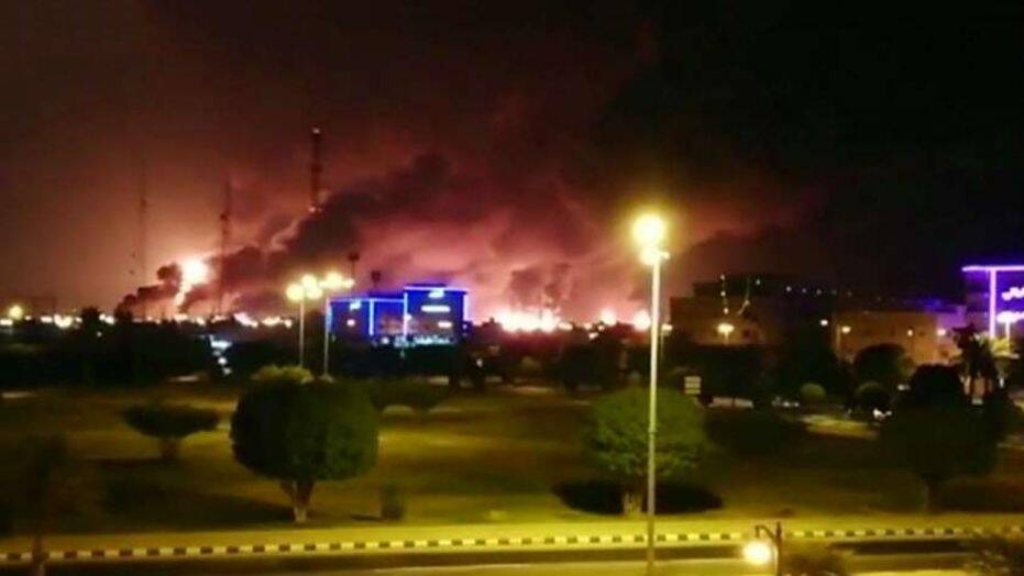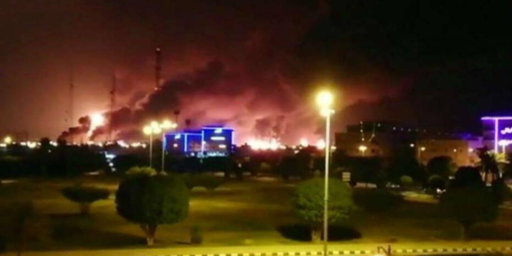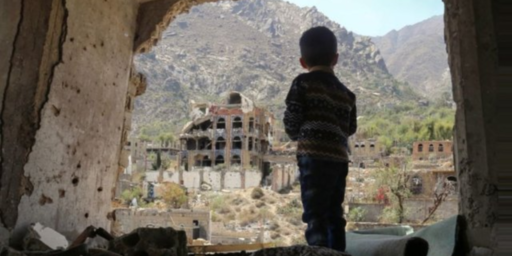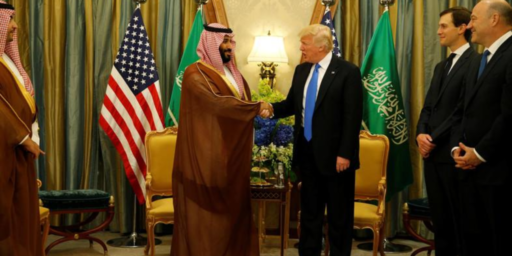Major Drone Strike Hits Large Saudi Oil Facility
Houthi rebels in Yemen have claimed responsibility for a massive attack on an important Saudi oil facility.

The simmering war in Yemen between government forces backed by Saudi Arabia and Houthi rebels backed by Iran has long been seen as something of a proxy war between the Islamic Republic of Iran, which is backing the Houthi rebels, and the Kingdom of Saudi Arabia, which is backing the government. That conflict took a serious and potentially escalating turn yesterday with an attack on a major Saudi oil facility that could have a significant impact on world oil markets and the world economy:
Drone attacks claimed by Yemen’s Houthi rebels struck two key oil installations inside Saudi Arabia on Saturday, damaging facilities that process the vast majority of the country’s crude output and raising the risk of a disruption in world oil supplies.
The attacks immediately escalated tensions in the Persian Gulf amid a standoff between the United States and Iran, even as key questions remained unanswered — where the drones were launched from, and how the Houthis managed to hit facilities deep in Saudi territory, some 500 miles from Yemeni soil.
Secretary of State Mike Pompeo accused Iran of being behind what he called “an unprecedented attack on the world’s energy supply” and asserted that there was “no evidence the attacks came from Yemen.” He did not, however, specify an alternative launch site, and the Saudis themselves refrained from pointing the finger directly at Iran.
President Trump condemned the attack in a phone call with Saudi Crown Prince Mohammed bin Salman and offered support for “Saudi Arabia’s self defense,” the White House said in a statement, adding that the United States “remains committed to ensuring global oil markets are stable and well supplied.”
The Houthis said they had launched the aerial attacks with 10 drones, which would amount to their most audacious strike on Saudi Arabia since the kingdom intervened in Yemen’s war more than four years ago. The Saudi-led bombing campaign has devastated the impoverished country and exacerbated the world’s worst humanitarian crisis.
The Houthis are part of a regional network of militant groups aligned with and backed by Iran, Saudi Arabia’s regional rival. American and Saudi officials suspect that Iran has dispatched technicians to Yemen to train the Houthis on drone and missile technology.
United Nations investigators have written that the Houthis have acquired advanced drones that could have a range of up to 930 miles. That leaves open the possibility that the drones used Saturday had flown from Houthi-controlled territory in Yemen. But they may also have been launched from another country, such as Iraq, or from inside Saudi Arabia itself.
Iran’s Islamic Revolutionary Guards Corps has been training its militia proxies in the region, from Lebanon to Yemen, in more sophisticated warfare using drones, according to two people in Iran with knowledge of the programs.
In Yemen, for example, after Houthi missiles targeting Saudi Arabia were intercepted, Iran moved to train Houthis in drone technology, taking groups to Iran to master assembling, managing and repairing drones, said the people familiar with the programs.
The Houthis have attacked Saudi infrastructure before, primarily with less accurate ballistic missiles.
The targeted oil facilities can process 8.45 million barrels of crude oil a day between them, the bulk of production in Saudi Arabia, the world’s largest oil exporter. Saudi Aramco, the state-owned oil giant, said production of 5.7 million barrels a day — well over half of the nation’s overall daily output — was suspended.
It was not immediately clear how badly the facilities were damaged, but shutting them down for more than a few days would affect the global oil supply. Analysts who closely follow the Saudi oil industry said they were hearing that the impact would not be severe — perhaps only a few days’ outage, which the Saudis could cover.
“Crude prices will still rise a bit, but apparently the world economy dodged a bullet,” said Robert McNally, the president of Rapidan Energy Group, a Washington-based market research firm.
More from The Washington Post:
ISTANBUL — Explosions and towering fireballs struck the heart of Saudi Arabia’s oil empire on Saturday in an apparent wave of drone attacks claimed by Yemen’s Houthi rebels. The blows knocked out more than half the kingdom’s oil output for days or more and threatened to drive up already high tensions between Iran and its foes in the Persian Gulf.
The predawn blasts on facilities of the state-run oil giant Aramco — which the rebel group claimed were carried out by a fleet of 10 drones — marked one of the most devastating strikes into Saudi territory claimed by the Iranian-allied Houthis in more than four years of war in Yemen.
It was also the most serious attack on Saudi Arabia’s oil infrastructure in decades, which includes barrages of Scud missiles fired by Saddam Hussein’s forces during the 1991 Gulf War. A NASA satellite image showed what appeared to be a long streak of black smoke flowing to the southwest from the Aramco site.
An Aramco statement said production of 5.7 million barrels of crude was suspended by the attack from “projectiles.” That represents more than half of the kingdom’s output and about 6 percent of global oil supply — a shortfall that could send oil prices sharply higher.
The Aramco statement did not give any timetable on how long the production could be curtailed. In Washington, the Department of Energy said that the United States was prepared to tap U.S. emergency oil reserves if necessary to cover supply disruptions.
The blasts struck facilities in the districts of Khurais and Abqaiq, Saudi officials said. That is more than 500 miles from the Houthi-controlled zones in Yemen — raising critical questions about Saudi Arabia’s ability to defend its territory from Houthi missile and drone attacks with apparent expanding range.
The rebels’ claim of responsibility, if confirmed, further highlighted their rapidly advancing military prowess. Saudi Arabia and the United States accuse Iran of providing the Houthis with military equipment and technical expertise, a charge Tehran has denied.
Houthi missiles have struck Saudi sites before, including its oil infrastructure. But the latest strike on Aramco was a symbolic blow against the historical hub of the kingdom’s oil riches, and the centerpiece of Crown Prince Mohammed bin Salman’s plans to remake the kingdom’s economy.
The company is preparing an initial public offering intended to raise billions for an economic reform program championed by the crown prince to move the country away from its dependence on oil revenue.
The attacks are likely to drive up global oil prices when trading resumes after the weekend and Saudi experts assess the damage. Benchmark Brent crude was just above $60 a barrel on Friday.
Khurais is one of Saudi Arabia’s largest oil fields and is believed to produce about 1.5 million barrels per day. Abqaiq is the site of the kingdom’s largest oil processing facility, operated by Saudi oil giant Aramco. It may be the world’s most important piece of oil infrastructure, built to process about 7 million barrels a day of oil so that it can be shipped out of the Persian Gulf to foreign markets.
Saudi Arabia produced 9.85 million barrels of oil a day in August, making up about 10 percent of the global supply.
Videos posted online showed gigantic fires sending up huge plumes of smoke. Large explosions and the sounds of gunfire could be heard in some of the videos.
A statement by the Saudi state news agency said that the attacks occurred about 4 a.m. and that Aramco teams had contained the fires. The statement did not say whether anyone was injured.
Saudi Arabia said it was still trying to determine who had carried out the attack, despite the Houthi claim.
Col. Turki bin Saleh al-Malki, a spokesman for the Saudi-led military coalition fighting in Yemen, said in a statement that physical evidence was collected but that “investigations are ongoing to determine the parties responsible for planning and executing these terrorist attacks.”
Perhaps the most interesting thing about the attacks is the fact that the oil facility that was hit was not in the southern portion of Saudi Arabia that borders Yemen, but closer to the central part of the country on the west coast bordering the Persian Gulf and north of the United Arab Emirates and Bahrain. This is a significant distance from Yemen and suggests either that the drones that were used have a significant range or that they were launched from a location other than Yemen.
This is apparently one of the reasons that the United States is blaming Iran for the attacks and others are suggesting that the attack could have been launched from somewhere such as Iraqi territory controlled by groups that are sympathetic to Iran, or even from Iran itself or from boats in the Persian Gulf. Obviously, this would be a significant expansion of the Yemeni war and would increase tensions in the Gulf region after several weeks during which seemed to cool down from a summer that saw attacks on shipping and attacks by Iranian and American forces on drones from each nation. In response to that and to recent attacks on tankers in the Gulf of Oman that the United States has blamed on Iranian forces, President Trump first ordered and then canceled a retaliatory strike on Iranian forces. Then, the United States imposed new sanctions on Iran in response to the heightening of tensions in the Persian Gulf. As noted at that point, though, those sanctions were unlikely to work and the Trump Administration has very few options in the regions. A direct attack like this on the lifeblood of not just the Saudi economy but the world economy could lead to significantly increased tensions in the region.
Beyond the question of what this might mean for tensions in the region, there is also the question of what this might mean for global oil prices and, more broadly, the global economy. As noted above, this strike has impacted roughly half of Saudi Arabia’s daily oil production. This likely will mean at least a temporary increase in global oil prices, but it’s unclear what the long-term impact could be. The answer to that question depends largely on the extent of the damage and how long it will take the Saudis to get the facility back up and running. This morning, there’s at least some speculation that the impact could be minimal and that the Saudis will be able to get the facility back up and running in a matter of days. If that’s the case, then the impact will be minimal. If it takes longer, then we’re looking at a far more serious impact on the global flow of oil and there are already some suggestions that the United States may open up access to the Strategic Petroleum Reserve to help stabilize prices, but that’s going to depend largely on what the Saudis end up saying about how quickly they can recover from this.
To say the least, though, this attack has the potential to become a big deal in a relatively short period of time.






Somewhere, John Bolton is reading about this, screaming “Bomb them! Bomb them! Bomb the Iranians!”
But, he also might have that reaction to the crossword puzzle…
I am shocked, shocked I tell you, that the Iranians would react to an unprovoked attack on their economy by doing the same to Saudi Arabia. It would appear the Strait of Hormuz isn’t the only vulnerable choke point on the world oil supply.
Thank you mr. trump, a job well done, well done indeed.
Really, the Saudis went looking for this and found it.
Surely they know you can’t go and pound another country, without it doing a counterattack that will really sting.
Technically, yes, the Houthi effectively fighting back is an expansion and an escalation of the war.
I know next to nothing about the Houthi, so I’m not willing to say they are the good guys here, but I know that the Saudis are definitely bad guys if not the bad guys. I guess that I have trouble siding with a government that carves up a reporter in their consulate with bone saws.
Hopefully, facing meaningful consequences for their actions will make the Saudis reconsider their war in Yemen. But, whatever happens, we should not be involved.
We can have zero confidence in anything reported by Trump’s CIA. The man still has a Sharpie. If this is the Houthis, good for them. If it’s the Iranians, what did anyone expect? Unfortunately unless we get confirmation from an intelligence service beyond Trump’s reach, we aren’t going to know who did it.
In any event, this should not be our problem. We have no dog in this fight.
From a couple of analysts I’ve read, it’s important to realize that “drones” here is probably less like the quadcopter that jumps into everyone’s mind when they hear the word, and more like home-brew cruise missile. Hundreds of miles of range, probably on the order of a hundred pounds of explosive. I’ve said for a few years that a basic cruise missile has become a straightforward software problem. Even kludge-like solutions for the sub-problems are effective when you can run them on a cheap few billion ops-per-second processor.
1) Shite-for-brains pulled out of the JCPOA & re-constituted crippling economic sanctions on Iran. Did anyone really expect Iran NOT to retaliate?
2) The KSA is acting like the Israelis: They’ve got Uncle Daddy USA backing their play, so they’re engaging in all kinds of geopolitical mayhem, thanks to aforementioned Shite-for-brains.
Not our circus, not our monkey. We got no business getting involved in this.
We’re going to bomb someone and we’re waiting for the fwcking Saudis to tell us who?! And “under what terms”? WTF?
As a drone operator, I’ve been searching pretty hard today to find out if I can buy an armed drone in the United States. I mean, I’d really like one to scare off any potential trespassers, and the 2nd Amendment says I can have whatever kind of armed weapon I want, right? /sarcasm
Best I can find is an industrial drone that can carry an unidentified payload, best suited for mining purposes, and I cannot buy it from the US, but it’s available overseas. Apparently I can drop shit all over the damn place, but I can’t have an armed, targeted drone, because it’s a “weapon of war”? also /sarcasm
Just got myself on all kinds of watch lists. You’re welcome.
@Michael Cain: I’m no expert on this stuff but from what I’ve read – IF I were highly invested (seven figures or more) I would have very little difficulty matching people who could duplicate the German achievements of 1945 in the V-1 ‘drone’ with some GPS system (there’s more than one, children!) and with enough fuel – voila! I could blow up something 500 miles away.
Don’t we all love living in the 21st century!
The broad spectrum of dahces includes contemporary, classical, ballroom, street,
jazz, hip-hop, musical theatre and all of their sub-genres.
Yoou can head to visit to have a DVD Creaqtor
to create your photfos into a DVD. In this Shahrukh Khan has played role just as the one
played in Super Hero.
@OzarkHillbilly:
That’s droolingly stupid.
The Houthis have entirely their own agenda and are not mere playthings of the Iranians (they are contrary to the loose language used by Americans, not Shia in the fashion of the Iranians, they’re Zaidis that are in fact really a flavour of kharijia ibadia rather than 12ver Shia like the Iranians and the Lebanese (or generally what is called Shiism).
While there’s an alliance right now, by no means are the Zaidis natural allies of the Iranians, historically they have been quite hostile to 12vers, and ironically long friendly with the Saudis until the recent Prince turn to Boltonism.
@Kathy:
Quite. Adventurism has its price.
@dennis: Iran has been attacking areas right and left. The US and other countries certainly should not be into these agreements with them. Just the other day, Thursday maybe, Iran’s leaders were once again hollering “Death to America! Death to Israel!”
There should be no agreements or trade with Iran until they start behaving.
Paul Begley has some details about this that have not come out on the news. It has all been predicted.
@gVOR08:
A few days I wrote here that I thought a “yes man” in NatSec would be better than Bolton and this is exactly why.
I will be very surprised if we take any military action. Again, what we have seen over and over again is that Trump will talk very aggressively and almost never follow through (the one exception being with Assad in Syria and I think that had more to do with Obama’s red line than anything else).
That isn’t to say he cannot be pushed into action. But everything shows that his tendency isn’t towards direct military action. So the fewer people around him advocating for that, the better.
@Tyrell:
If anyone was remotely curious:
https://www.paulbegleyprophecy.com/about
It just makes the person citing this guy seem even more pathetic.
@mattbernius: No, I think it’s the gourmet coffee line that makes him seem even more pathetic, sorry. https://store.paulbegleyprophecy.com/coffee